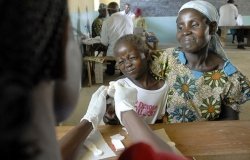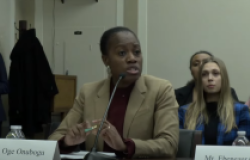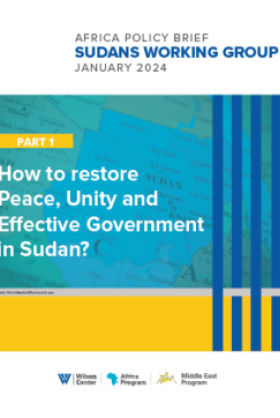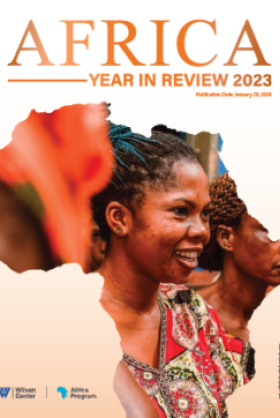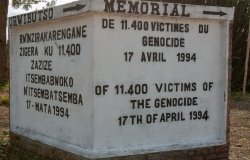Capital Accumulation and Emergence of New Power Elite in South Africa and the DRC
On Wednesday, August 22, 2007, the Woodrow Wilson International Center for Scholars' Africa Program hosted Patience Kabamba to present his doctoral research project entitled Capital Accumulation and Emergence of New Power Elite in South Africa and the DRC.
Overview
 On Wednesday, August 22, 2007, the Woodrow Wilson International Center for Scholars' Africa Program hosted Patience Kabamba to present his doctoral research project entitled Capital Accumulation and Emergence of New Power Elite in South Africa and the DRC. Kabamba, a 2007 Africanist Doctoral Fellow at the Woodrow Wilson Center, focused his argument on the importance of economic elites being embedded in the community to ensure true impact on the development of the whole community. He used case studies comparing the Nande of Butembo in the Democratic Republic of Congo (DRC) to the Black Economic Empowerment (BEE) of South Africa. Dave Peterson, Senior Director of the Africa Program of the National Endowment for Democracy (NED), served as moderator.
On Wednesday, August 22, 2007, the Woodrow Wilson International Center for Scholars' Africa Program hosted Patience Kabamba to present his doctoral research project entitled Capital Accumulation and Emergence of New Power Elite in South Africa and the DRC. Kabamba, a 2007 Africanist Doctoral Fellow at the Woodrow Wilson Center, focused his argument on the importance of economic elites being embedded in the community to ensure true impact on the development of the whole community. He used case studies comparing the Nande of Butembo in the Democratic Republic of Congo (DRC) to the Black Economic Empowerment (BEE) of South Africa. Dave Peterson, Senior Director of the Africa Program of the National Endowment for Democracy (NED), served as moderator.
Kabamba began his presentation with an explanation of the framework he used to examine the case of the Nande and the BEE. Elite economic theories state that a strong state is the solution to economic development. While an essential part of capitalism is the tie between the state and the business elite, he argued that it is not the quantity of state involvement but rather the type of state involvement that matters. Kabamba compared the Nande who are living under a weak state, the DRC, yet thriving and the BEE under the stronger state of South Africa, where the black majority has not experienced the economic development it expected after majority rule in 1994. In this comparison Kabamba does not see the strong state leading directly to economic development of the population.
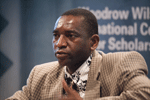 Kabamba then applied Peter Evan's theory that the ideal for a developing state is an "interpenetration" of the state and the economy, to the cases of the BEE and the Nande. These represent two kinds of elite, one that is autonomous from society, the second that is embedded in society. It is this second group that can successfully "lift up" those who are not elites to greater economic gains, Kabamba said.
Kabamba then applied Peter Evan's theory that the ideal for a developing state is an "interpenetration" of the state and the economy, to the cases of the BEE and the Nande. These represent two kinds of elite, one that is autonomous from society, the second that is embedded in society. It is this second group that can successfully "lift up" those who are not elites to greater economic gains, Kabamba said.
The Nande Case:
The Nande in Eastern DRC have traded gold with Asia since the 8th century. During Belgian colonization, this tribe was basically left alone, and held power in their community. In the 1960s, white plantation owners left the country, and the Nande took over the management of the plantations. This created wealth to sustain their trade. When the state collapsed during Mobutu's regime, the tribe of traders developed their area of the eastern Congo with the help of the Catholic Church to build schools and health services. Where most of the country was lacking infrastructure, here was a tribe that was creating a sense of development for their community.
Kabamba described the Nande as trans-network traders, bound by trust and kinship. Representatives of the central government are mere figureheads in their community. Nande wealth is dependent on the existence of the community. The Nande also use a local militia to protect their wealth. Currently there are 12 US millionaires in the Nande tribe in Butembo, DRC. They find a balance between the space to engage outside and the space of dependence inside the community.
The Black Economic Empowerment (BEE) case:
In 1994 when the African National Congress, ANC, gained power in South Africa, it wanted to create a group of black elites to lift up the black majority in terms of economics. Those who benefited were those who had been involved in the anti-apartheid fighting under 5 categories:
1. Activist-capitalist: comrades in business;
2. Educated-exiled: post 1976 generation which was not politically connected to the ANC;
3. Corporate-sophisticate: recruited;
4. Consultants of change; and,
5. Conference circuit champions: strong connection with the white economic elite.
Some of these Blacks are now wealthy, but disconnected from the community and empowered only by the state. They don't pass on their skills to the majority. They remain at the management level and not even always at the very highest level. Kabamba argues that there is a residual legacy of inequality in South Africa. Though the country is industrialized and developed, the black entrepreneurship has difficulty connecting to the black majority. Now the Neo-liberal South African class is a challenge, creating tensions and a large split in the ruling alliance.
Questions raised by the audience focused on the replicability of the Nande example. Kabamba stated that one can replicate the value of the Nande's work and money because business is a portable art. However, because strong kinship trust is the key to their success, in cases where kinship is not strong the Nande example cannot be replicated. When a questioner raised the example of Katanga province as another model of economic development, Kabamba replied that the difference is that unlike the Kasai, the Nande tribe invests at home. Furthermore, the Nande case should be sustainable under the decentralization of the new constitution in DRC as these traders have been in strong position since at least the 1970s and 80s. Kabamba stated that his hope is that the Nande will also go to Kinshasa during peace time and share their business skills. He reiterated that he does not think theirs is the ideal situation for the entire country where a private militia and traders hold power in a certain area to sustain its development.
Another question brought up similarities in the features of the Nande traders and the Italian mafia of one hundred years ago and if the tribe in Butembo is ready to transfer power to a future stable and viable central authority. Kabamba replied that this depends on the kind of state that emerges. Mobutu's state was predatory and lacked the trust that a successful decentralization requires. The DRC has not yet reached the level of trust needed and so far there are mixed responses in Butembo to the recent elections.
During the Q+A session further clarifications on South Africa's case focused on the distinction between political and economic empowerment. Kabamba noted that despite the rise of the ANC in political leadership, the economic elite in South Africa remain predominately white. The trickle-down idea has not worked. Now at the government level in South Africa there is room to trust the elite, but this has to be through individual empowerment. The BEE is a direct link to the state, giving state companies to Blacks and doing business with companies only if they have black management. Elites are professionals, not businessmen or traders. He argued that whites have not been engaged in this empowerment. One suggestion from the audience was to look more at capacity building and the growing middle class in South Africa to really compare. Kabamba responded that the BEE has not answered the question of diffusing skills and lifting up the majority. How this skill building is done is a question for the future. When the ANC fails to deliver all that it has promised there may be a rift in its constituency and the creation of another liberation movement.
Kabamba emphasized that the Nande case reveals a group of home-grown elites in a pre-industrial situation thriving as opposed to the state imposed Black Economic Empowerment in South Africa, which has been less successful in terms of economically empowering Blacks in an industrialized setting. The Nande example shows that unless the elites are really embedded in the community, no matter how rich they may be, they cannot impact the whole community. According to Kabamba, the BEE in South Africa may be the kind of state involvement where the end goal is to improve individual capabilities, and not those of the whole community.
Prepared by Alicia Ranck, Intern and Roseline Fodouop Tekeu, Program Assistant, Africa Program.
Hosted By

Africa Program
The Africa Program works to address the most critical issues facing Africa and US-Africa relations, build mutually beneficial US-Africa relations, and enhance knowledge and understanding about Africa in the United States. The Program achieves its mission through in-depth research and analyses, public discussion, working groups, and briefings that bring together policymakers, practitioners, and subject matter experts to analyze and offer practical options for tackling key challenges in Africa and in US-Africa relations. Read more
Thank you for your interest in this event. Please send any feedback or questions to our Events staff.




